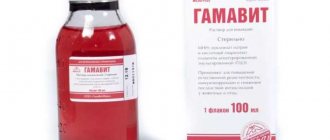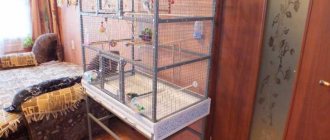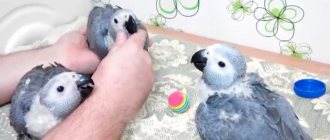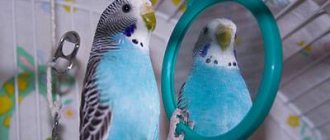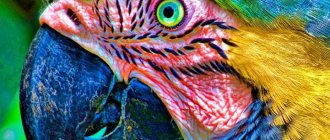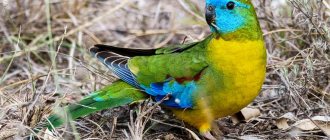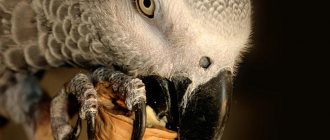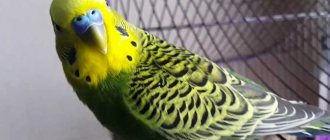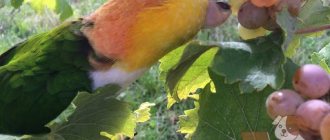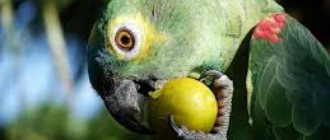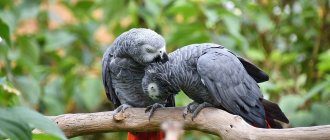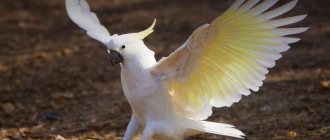When purchasing a pet parrot, it is not enough to furnish the house and buy the necessary toys for its development. It is important to think over the menu of your feathered pet, otherwise stomach problems may arise. Food poisoning is often found in cockatiel parrots; this is due to the inattentive attitude of the owner towards the bird.
People neglect the basic rules of feeding cockatiels:
- fruits and vegetables should be present selectively in the parrot’s diet;
- you cannot feed the bird from your table;
- Corella needs sprouted grains;
- the water in the drinking bowl should be changed 1-2 times a day;
- food is selected taking into account the needs of the cockatiel.
Knowing these rules, you can avoid unpleasant diseases in cockatiels. But sometimes the owner is concerned about some issues related to new products in the parrot’s diet. For example, where to get sprouted grains or whether it is possible to give cockatiels the fruits of legumes. It is worthwhile to dwell on these issues in more detail in order to avoid unpleasant consequences from one’s own lack of enlightenment.
How seeds, grains or millet are germinated
Usually, ordinary oats are used for these purposes, but you can also use other crops from which healthy and fresh grass sprouts.
Sprouted grains have a positive effect on the digestive and immune systems of poultry. All vitamins and microelements are preserved during germination , but become more concentrated.
Regular consumption of such grains ensures an increase in the protective functions of the bird’s body.
A proper diet guarantees effective prevention of infections or colds. The grains provide improved bowel function. Parrot owners note that adding sprouted grains to the diet prevents vitamin deficiencies and anemia, and also improves plumage.
What food do you give your parrots?
I make it myself from the store
Manufacturers of mixtures rarely fingerprint each grain, so before germination it is necessary to properly prepare the material. If the grain floats after it is filled with water, then this indicates low quality, so it cannot be used for germination.
To germinate food yourself, prepare the following elements:
- high-quality and competently tested grains;
- dishes, and it is advisable not to use metal containers;
- cloth or gauze that covers the grains.
It is recommended to choose only grains purchased at a pet store, and not in bulk at the market.
Can parrots eat oats and in what form?
In terms of the composition of useful substances, oats are equal to medicinal plants. Its benefits were known back in ancient times and were actively used not only for food, but also for treatment of various diseases.
Our article will be useful to those who are interested in this plant. We will talk about the positive effect the plant has on the body, what advantages it has over other grains, and give information on who should be careful about its use.
Sequential instruction
To grow high-quality and healthy sprouted grains for your parrot, it is recommended to use the correct instructions.
To do this, the following actions are implemented:
- Usually oats are chosen for birds, which need to be washed well to remove dirt and debris;
- For washing, use a deep container filled with water;
- if any grains float, they must be thrown away, since they cannot be germinated due to the lack of germs;
- then the grains are filled with water, and the container with them is moved to a warm place;
- after a day, the seeds begin to swell, so they are washed again and placed in the same container;
- then they are covered with damp gauze or a rag, and the rag must be periodically moistened to prevent drying out;
- After a day, the first shoots appear, so the seeds can be given to the birds.
The finished product can be given to birds daily, but in small quantities. It is especially important to use it during molting or nesting periods.
It is also useful to read: Rules for selecting a pair for a budgie
What is forbidden to feed?
Now that we know what can be given to budgies, let's talk about forbidden foods. Among the vegetables prohibited for parrots are: radishes, celery, onions, eggplant and garlic. Prohibited foods include some fruits: avocado, mango, persimmon. In addition, any herbs (parsley, cilantro, dill) can ruin the health of the bird.
Many people ask questions about what other food is not included in the list of permitted foods. Products such as bread (made from salt, yeast or low varieties of wheat), salt (this is poison for this type of bird), milk (parrots do not have enzymes to process it), chocolate can also be detrimental to the health of these birds.
Features of the process at home
For effective and simple seed germination, you can use easy recommendations.
These include:
all seeds are first checked for suitability, for which they are filled with water in such a way that all the grains are hidden, since if they float, they cannot be used for germination;- if a lot of seeds emerge from one portion, then it is better to abandon such food altogether, since it is of low quality;
- It is recommended to soak the grains in dishes made of clay, glass or porcelain, and enameled products are also suitable for these purposes;
- It is desirable that the length of the seedlings does not exceed 2 mm, but the seeds have different germination rates, so it is quite difficult to keep track of this parameter;
- if the grain is overgrown, then it loses its usefulness for the parrots, so it is advisable to soak the seeds for a day in the morning in order to give the parrots the finished product every other day;
- if you get a significant portion that the bird cannot eat at one time, then you can store the leftovers in the refrigerator, but no longer than one day;
- if any grains have not sprouted, then they should not be given to the bird, as there is a possibility that they are infected and therefore will harm the health of the pet;
- when purchasing seeds for germination, it is advisable to focus on mixtures sold in packages, and also take into account the shelf life of the product;
- after purchase, it is advisable to pour the mixture into an airtight container or glass jar, which helps protect the seeds from mold or mildew;
- It is not allowed for the grains to have any stains;
- It is not recommended to use a product with an unpleasant odor.
If dead insects are found in a bag or jar of formula, it is recommended that you throw away all the food.
General rules for creating menus
Regardless of whether ready-made food is purchased for birds, it is necessary to follow the main rules of the diet for a domestic budgie. The menu for an adult pet should include:
Corn.
This product is considered the main product in the poultry menu. You are supposed to give two teaspoons daily, but for some pets this amount is not enough. You can increase the portion.
The grain must always be in the feeder.
Sprouted grains and legumes.
In this form, the products are absorbed better and provide a complete supply of minerals and vitamins. The amount of sprouted feed is determined by the age of the bird. The maximum dose is 2 teaspoons every seven to ten days. It is intended for parrots before their first molt. Then these foods should be given less often, as they activate the synthesis of the sex hormone. Various types of grains can be used in sprouting.
It is prohibited to use flax and hemp seeds for germination.
Mineral supplements.
This food is necessary to maintain the normal state of the skeletal system and feathers. In addition, such supplements activate digestive processes. Mineral mixtures are available in pet stores, but you can prepare them yourself. The composition includes: charcoal and egg shells in equal quantities, chalk, divided into pieces about 3 mm in size, and shell rock. The finished products offered in pet stores contain cedar nut shells, crushed oyster shells, sandstone, fractions of corals, and sea shells. Birds during molting need to add a little sulfur to this composition. Mineral supplements are poured into a special container. They should be in the pet's cage at all times. Supplements need to be replaced weekly.
Mineral stones, pieces of cuttlefish shell.
They are suppliers of phosphorus and magnesium; the parrot needs them to sharpen its beak.
Vegetables fruits.
These products contain a large amount of vitamins. You can give them several times every day.
Cereal porridge.
Boiled in water and served warm. For one serving you need two teaspoons of cereal. Cooking time depends on the type of product. Barley cooks for half an hour, corn, millet, rice, barley - 20 minutes, lentils, oatmeal, buckwheat - need to be cooked for 10 minutes or steamed with boiling water. Porridge should be given to a parrot three times a week. This food supplies many important microelements and normalizes metabolic processes.
Greenery.
This is a natural storehouse of vitamins and minerals. You can give parrots green mass: strawberries, peas, oats, canary grass, perennial chaff, fireweed, barnyard grass, timothy, hedgehog, chamomile, clover, chicken millet, willow, lettuce and leaf lettuce, bluegrass, wheatgrass, chicory, plantain, chickweed, swamp bentgrass. You can put young twigs with buds in the feeder. In winter, greens are grown from food intended for parrots.
If you are not sure whether you can give your pet an unfamiliar herb that is not included in the list, it is better not to risk it
There are plants whose greens cannot be given to pets. This category includes: yarrow, cilantro, tansy, horsetail, St. John's wort, hyssop, buttercup, sorrel, basil, wormwood, dill, parsley, celery, celandine.
Branches from a berry bush, fruit tree.
All parrots love to chew on things. The branches will help satisfy this desire and benefit the body. It should be noted that this natural material must be taken in environmentally friendly places, away from highways and industrial zones. Before placing the branches in the pet's cage, they need to be kept in water for about four hours, washed, and scalded with boiling water. The resin must be removed. The best options are: currant, chestnut, rowan, apple, rowan, birch, viburnum, sea buckthorn, beech, hazel, hawthorn, plum. There are also prohibited plants. You should not give the bird branches of oak, spruce, pine, fir, elderberry, acacia, juniper, bird cherry, or lilac.
Delicacy.
Budgerigars also have treats. But their number should be strictly limited. Otherwise, the pet will refuse regular food. Treats should include only natural products. You can pamper the bird with chumiza, mogar, red or Senegalese millet. You should not feed your parrot seeds, nuts or pine cones. There is no need to include concentrated food in the form of sticks in the diet. Their composition is supplemented with synthetic dyes and preservatives, it includes low-quality grain and dry vitamins.
Vitamin complex.
In some cases, the parrot's body does not have enough vitamins from food. It is necessary to fill the deficit, to eliminate dysfunctions of organs and systems. To conduct the course, funds can only be purchased at a veterinary pharmacy, a specialized store. While taking vitamins, pieces of vegetables and fruits should not be given. The supply of these elements should be carried out only by preparations added to water. It is necessary to replace the water twice a day, since the quality of vitamins is quickly lost and the liquid deteriorates.
Vitamins should not be given to pets until the first moult has passed.
Water.
It is a fundamental component. Without water, the pet’s body will not be able to efficiently carry out the processes of metabolism, synthesis, and cell regeneration. It should always be kept in a drinking bowl. The water is changed regularly.
Following these rules for feeding budgies will help keep your pet's body in excellent condition. Using them, you can develop a varied and healthy diet that will definitely please your beloved pet.
How often should birds be given grain?
If previously the bird ate sparingly, since its diet consisted mainly of purchased mixtures, then it is not recommended to suddenly feed a lot of sprouted seeds. This can lead to the activation of the hormonal system, so the birds become aggressive or have an early start to the nesting period.
It is recommended to introduce such a product gradually , after which it becomes a permanent part of the diet. Seed germination can be done all year round, so birds will always have access to this healthy food.
This product is especially relevant in winter, when it is difficult to find grass or healthy vegetables. Usually, owners of budgies prefer to give them sprouted seeds in the morning and evening in small quantities.
Oats: benefits and harm
It is extremely popular among people and animals. It is used with pleasure as food, used for treatment, and various decoctions and infusions are prepared. This cereal has a unique composition of vitamins, microelements, minerals, acids and oils. It stores ABEF vitamins, trace elements potassium selenium, copper, iodine, manganese, pantothenic acid, amino acids, mineral salts and essential oils.
Oats improve immunity, help fight viruses and bacteria, lower body temperature during illness, and have a diaphoretic effect. It is used to treat the liver and this is one of its key capabilities.
One of their forms of using this culture is decoctions. They retain almost 100% of all useful substances. Special decoctions are prepared to treat the liver. Oat decoction cleanses the body and helps remove toxins and bad cholesterol.
This cereal also treats pancreatitis. If the form of the disease is mild, then the plant itself is enough to cure it. If the disease is advanced, then it is used along with medicinal treatment.
They treat intestinal problems. In order for carbohydrates to be better absorbed, the catalyst found in this cereal comes to the rescue.
The composition contains magnesium, which is necessary to improve the functioning of the cardiovascular and nervous systems and metabolism.
Eating oats makes it possible to fill the body's need for silicon, potassium and phosphorus.
Satiety comes very quickly when consumed. The composition contains a lot of fiber, which helps remove excess fluid from the body.
This cereal can be considered a panacea for many diseases, curing them even without the use of pharmaceutical drugs.
Oatmeal decoctions affect blood sugar levels, helping to lower them, strengthen the walls of blood vessels, and are an excellent laxative.
You can also make oil from it, which also contains many useful substances. It is used to cure ulcers and erosions, helps with cramps, and removes sand and stones from the body in case of urolithiasis.
Eating oats also has its contraindications. If you have an allergy to this plant, heart and kidney failure, cholelithiasis, inflammation of the gallbladder, decreased immunity, increased stomach acidity.
Sprouts are one of the most important components of parrot food
Sprouting is one of the best and most affordable ways to provide birds with natural nutrition.
The benefits of sprouts are incredible. Dry seeds provide all the nutrients, energy and information needed to become a plant. This way, when the seeds germinate, they have the nutritional value of the plant, but in a more concentrated form. The miniature sprout contains a huge “package” of useful substances for the parrot.
Seeds, in addition to their full potential for the future plant, also contain protective mechanisms that ensure their preservation. Including toxins, enzyme inhibitors that protect them until they begin to germinate. The seeds also contain fats, which are used to provide the sprout with energy for growth.
The sprouted seed gets rid of toxins, burns unwanted fat and turns from one type of food to another, more nutritious one. Sprouts contain vitamins A, C, E, B, minerals, amino acids, proteins, antioxidants, which protect the body of birds and are a means of preventing diseases.
The sprouts are literally “stuffed” with enzymes. These enzymes contribute to almost complete digestion of food. Research shows that in the first seven days of germination, the sprout contains 100 times more different enzymes than a fully grown plant.
You don’t have to be an experienced gardener or have sophisticated equipment—seeds can be germinated at home using simple equipment.
There are different sizes and types of seeds available for every size bird. I will give an example of three types of seed mixtures for different groups of parrots (large, medium and small). The mixtures are formulated taking into account both the size of the seeds and the balance of nutrients and calories.
Below are some parrot formulas offered by sproutpeople.org. All these mixtures for germination are not difficult to make yourself.
